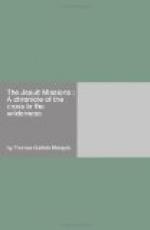Isaac Jogues, having returned to Canada after his brief rest in France, was now stationed at Ville Marie. His knowledge of the Mohawk language and character made him the most fitting person to send as envoy to the Mohawks, in the twofold capacity of diplomat and missionary. At first, as his sufferings rose before his mind, he shrank from the task, but only for a moment. He would go fearlessly to these people, though they lived in his memory only by the tortures they had inflicted on him. He set out; and on arriving at the Mohawk towns he found the savages friendly. Everywhere the Mohawks bade him welcome. They listened attentively to the message from the governor, and accepted the wampum belts and gifts which he bore. Apparently the Mohawks were eager for the amity of the French. To both Jogues and Couture it seemed that at last the time was ripe for an Iroquois mission—the Mission of the Martyrs. Before saying farewell to the Mohawks Jogues left with his hosts, as a pledge that he would return, a locked box; and by the end of June he was back in Quebec to report the success of his journey. He then prepared to redeem his pledge to the Mohawks. He left Quebec towards the end of August, with a lay brother named Lalande and some Hurons. He had forebodings of death, for on the eve of the journey he wrote to a friend in France: Ibo et non redibo, I shall go and shall not return. Arrived at the Richelieu, he was told by some friendly Indians that the attitude of the Mohawks had changed. They were in arms, and were once more breathing vengeance against the French and their allies. At this Jogues’s Huron companions deserted him, but he and Lalande pressed on to their destination. The alarm was only too well founded. The Mohawks at once crowded round them, scowling and threatening. They stripped Jogues and his comrade of their clothing, beat them, and repeated the tortures which Jogues had suffered four years before.
The innocent cause of this outbreak of Mohawk fury was the box which Jogues had left behind him. From this box, as the ignorant savages thought, had come the drought and a plague of grasshoppers, which had destroyed the crops, and also the pest which was now raging in the Mohawk towns. Some Huron captives among the Mohawks, no doubt to win favour with their masters, had maligned Jogues, proclaiming him a sorcerer who had previously brought disaster to the Hurons, and had now come to destroy the Mohawks. Undoubtedly,




